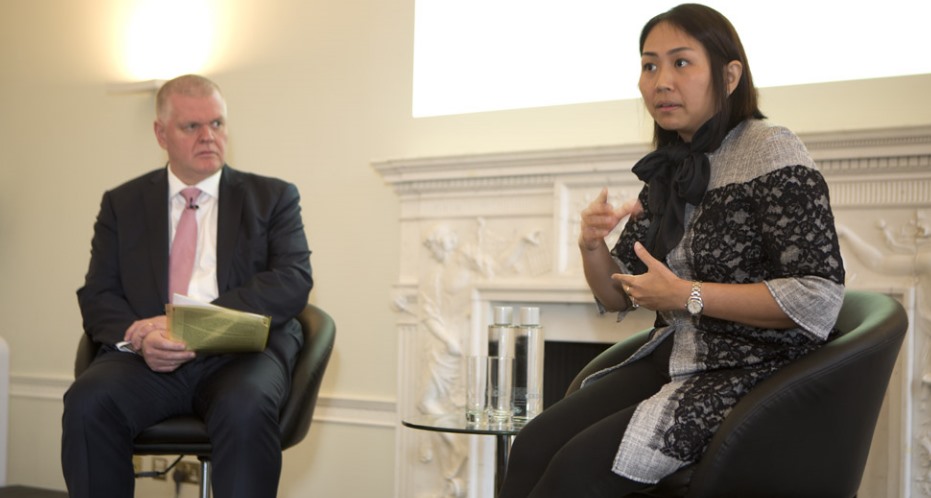Driving commercial and political engagement between Asia, the Middle East and Europe
Driving commercial and political engagement between Asia, the Middle East and Europe
Driving commercial and political engagement between Asia, the Middle East and Europe

Whilst some commentators express concern about growing economic nationalism in the world and its possible negative impact on global free trade, an Indonesian business leader has described Brexit and Donald Trump’s election as “disruption” which she says is good for commerce and keeps companies agile.
Anne Patricia Sutanto, Vice President Director, PT Pan Brothers Tbk, Indonesia’s largest garment maker, told business leaders at Asia House that she was unfazed both by Brexit and US-President elect Donald Trump’s election victory.
“I am an optimistic person,” she said. “Some good will come out of it if you are positive,” she added.
“It might be a good thing to disrupt the economy a bit,” she continued, pointing out that was precisely what the likes of Uber had done
“It’s not good to be constant and staid,” she added.
She said “disruptions” like the matter of Donald Trump being elected as President of the US meant that only those with a passion for their business could survive.
“This is the time for us to spark,” she told senior professionals at the conference ‘A new trade era – What it means for Asia and the UK’, which was held at Asia House on Wednesday in partnership with HSBC.
“Understand your company’s inner strengths. Don’t panic, but be dynamic on how you strategise your business. Disruption is good. It keeps you agile,” she said.
PT Pan Brothers Tbk has weathered the rollercoaster of Indonesian politics and multiple elections in Indonesia, she pointed out.
“Brexit and Trump are a minor thing compared to what Indonesians have experienced,” she continued, referring to the banks in Indonesia being liquidated in 1997 during the Asian financial crisis.
“Thank God HSBC stuck with us,” she added, in conversation with Noel Quinn, Chief Executive of Global Commercial Banking at HSBC. The duo were taking part in a panel discussion focused on the rise and disruption of micro-multinationals.
PT Pan Brothers Tbk is itself a micro-multinational – a new breed of players to have entered the global commercial landscape. It has seen its turnover shoot up from a US$12 million to US$420 million and from 2,000 employees to 37,000.
The apparel manufacturer supplies global brands such as Nike, Adidas and Spyder, importing textiles from Taiwan, Korea and China. “80 per cent of our imports are from Asia and 99 per cent of our goods are exported: 50 per cent to Asia, 26 per cent to Europe, the rest to the USA and other countries,” Mrs Sutanto explained.
Mrs Sutanto pointed out that doing business was not just about producers but also about relationships. “You need relationships with almost everyone,” she said.
“Trump does not matter for Indonesians. I predicted he would win. You have to remember he is not the world president, just the US president. As countries we just need to be strong and not depend on the US. He doesn’t care about the world but he cares about the US,” she said.
As for FTAs, she said despite Indonesia not having an FTA with the EU – unlike Vietnam – and also not being in the [now defunct] TPP – unlike Vietnam – her Indonesia-headquartered business had still prospered. “It’s not just about FTAs. It’s about how we actually deliver our goods, whether we deliver them on time and whether we offer a better service,” she said.
“The US needs Indonesia so we would be better off doing a bilateral with the US rather than waiting for the TPP to happen which is not going to happen. The UK should also do a bilateral with Indonesia,” she said.
Mr Quinn pointed out that non-tariff aspects were often not addressed in FTAs. “Often FTAs are long and complex and companies don’t use them,” he added. “There is no point in spending years of effort negotiating them if they are only getting 28 per cent utilisation,” he said.
Mrs Sutanto agreed and pointed out that better infrastructure and logistics would lower her business costs, as much as lower tariffs would. “FTAs are not the be all and end all,” she said.
naomi.canton@asiahouse.co.uk
